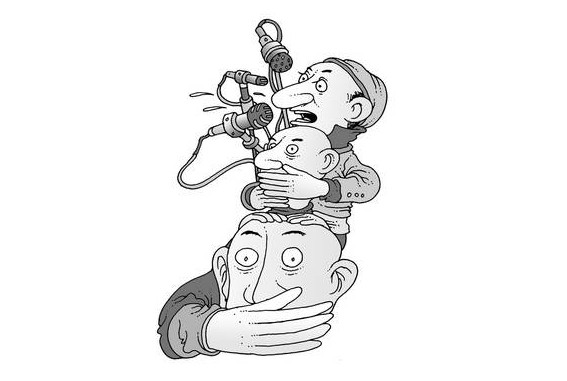 |
Edited and translated by Zhang Qian, People's Daily Online
Reading the recent policy speeches of western leaders might create the impression that most of the content concerns the domestic economy, the management of which is indeed a current and pressing task. However, closer inspection reveals an ongoing insistence on promoting 'western values' to the world. What lies behind this is not the objective of promoting values, but the intention of controlling other countries and maximizing western interests.
U.S. President Obama announced in the January speech of his second term: "We will support all democracy from Asia to Africa, from the Americas to the Middle East, because our interests and conscience drive us to act for those who yearn for freedom." Note that he put "interests" ahead of "conscience".
The West regularly employs the tactic of paying "democracy activists", who show their "conscience", by creating waves of discontent in our processes, the objective being to realize the dream of "beating the enemy without fighting". Western think-tankers have concluded that the Soviet Union is now destabilized by such waves to a very great degree. We must therefore be vigilant about this strategy, and never become confused by what purports to be friendly advice. Of course this should not prevent us from opening ourselves up and learning from what is positive in the west.
The current situation can be beneficial from our point of view. It can be separated into what is real and what is virtual. In terms of the real, the United States has fought two terrible wars and is now embroiled in economic problems; Europe is still mired in its sovereign debt crisis.
In terms of the virtual, three decades ago concepts like "democracy", "human rights" and "freedom" carried a halo of sanctity, and the non-western world did indeed look up to them as it struggled with its economic problems; a few people even began to regard them as precepts. But more than 30 years have passed, the halo is fading, and people are increasingly driven to ask: How can the situation in the western countries be so bad if western democracy is so good? Why are things still such a mess after a variety of "color revolutions" in countries like Iraq and Afghanistan? Such questions provoke deep reflection.
 |
 Chinese troops of "Peace Mission - 2013" arrive at exercise area
Chinese troops of "Peace Mission - 2013" arrive at exercise area Pakistan's rain-triggered accidents claim 29 lives: media
Pakistan's rain-triggered accidents claim 29 lives: media Daily life of auctioneer in Beijing
Daily life of auctioneer in Beijing Top 10 most dangerous jobs in the world
Top 10 most dangerous jobs in the world Zhang Ziyi graces Femina magazine
Zhang Ziyi graces Femina magazine Breathtaking images of extreme sports
Breathtaking images of extreme sportsDay|Week|Month